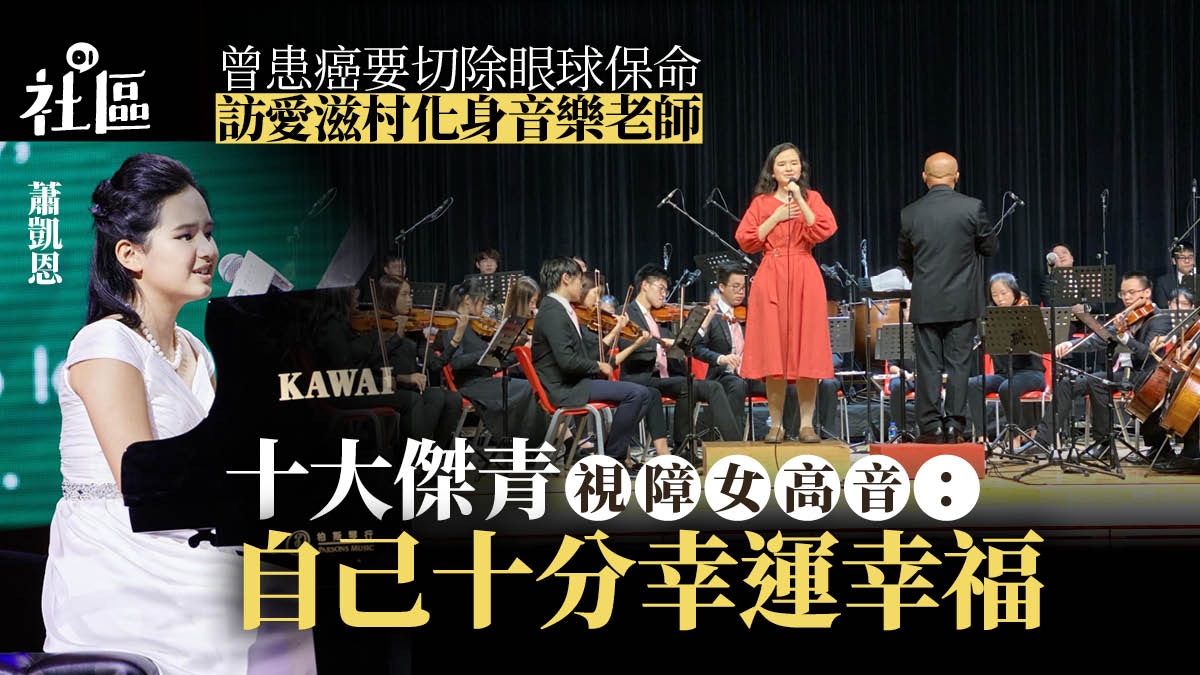Community topics
Written by: Zeng Fengting
2021-05-24 08:00
Last update date: 2021-05-24 08:00
It is never easy to take the road of music, and it is even more difficult if you have a physical defect.
Xiao Kaien, a young girl born in the 90s, suffered from eye cancer when she was 3 months old, which led to blindness in both eyes, but she still did not stop her from pursuing her dream.
She graduated from the Music Department of CUHK last year and became the first visually impaired graduate of the department. In the same year, she was also selected as one of the top ten outstanding young people.
In the process of chasing dreams, she has gone through many difficulties, but she is most grateful for the support of her parents, which made her what she is today.
Kane’s unique experience led her to be invited to sing the theme song of the movie "A Trip to the Eyes". She hopes to let the public understand the situation of the visually impaired through the song.
Xiao Kaien, who graduated from the Music Department of CUHK last year, was a visually impaired person since she was a child. She had a health check when she was 3 months old. The nurse found that her eyes did not respond to light, and the doctor confirmed that she had eye cancer.
The doctor suggested that her eyeballs should be removed to prevent the spread of cancer cells in order to save her life. Kane's parents were very uncomfortable when they heard the news.
Kane suffered from eye cancer when he was 3 months old and had to remove his eyeballs and became blind since then.
(Respondents provide pictures)
Because of an electronic piano and music
But the blindness is unstoppable. Kane's love for music. Kane started to learn piano at the age of 4 and singing at the age of 10.
It turned out that Kane’s desire for music originated from an electronic piano given by a childhood friend. "I think it’s fun, so happy. You can talk about it because blind people are more sensitive to sound, and the electronic piano is like an enlarged version of the toy to me. ".
Kane's family found that after she heard the nursery rhymes, it was easy to learn how to play them. They realized that Kane had a talent for music, so they let her learn the piano.
Kane’s music begins with an electronic piano.
(Respondents provide pictures)
After Kane entered middle school, in addition to continuing to learn piano, he also joined the school's choir. "In fact, from the beginning of Secondary Four, all the students around him left the choir because of their studies, but I insisted on it because I thought I could learn from it. stress reliever".
Knowing that Kane will develop into music in the future, he did not hesitate to take music as an elective in Secondary Four.
"Congenital insufficiency is not an excuse for laziness. Instead, I have to work harder. My conversational effort accounts for 70%, but my talent gets 1 or 2 points."
The visually impaired girl Hsiao Kaien
Braille sheet music is not common for the visually impaired to learn piano
Kane’s musical journey is not easy. In addition to having to take care of the overwhelming academic pressure, her blindness since childhood has made her often bumpy on the way to piano.
Kane said frankly that it is the most difficult to master the loudness and tempo of music, because blind people have congenital deficiencies. They cannot learn the details of music through music scores. Braille music and teachers who are experienced in teaching the visually impaired to play the piano are not common. It is more difficult for her to walk the music road than others.
For all kinds of difficulties, Kane chose to face optimistically, "Inborn insufficiency, not an excuse for laziness, but to work harder. My conversational effort accounts for 70%, but my talent gets 1 or 2 points."
In order to practice the music, Kane chose to write down all the details of the entire song and practice constantly, but it took more time than ordinary people to practice it.
In the early days, Kane's parents helped her read the sheet music from time to time, telling her the inner details, and Kane used the brailler to write them down one by one.
Afterwards, Kane received the advice of enthusiastic people and started to record the content of the music class. During practice, he took out the recording and listened to it repeatedly, and then memorized all the details in his head.
Assiduous practice gradually enabled her to play the music freely.
Music also accompanies Kane through every stage of her growth. Kane has long regarded music as a lifelong family with her.
She thinks that the way she gets along with music is similar to her family. "Music brings me a happy time. Although there will be difficulties and pressures, I am more happy than it is. At the same time, it brings me a sense of satisfaction. Motivation becomes better; family members are of the same nature, and they have different ideas when getting along, and they will also quarrel with them, but they will all understand each other, and then reconcile and get along better."
Parents support their love daughter to become the biggest help on the road to music
In fact, Kane can embark on the road of music, in addition to her extraordinary efforts and talents, but also the support of her parents.
Kane said that because of the visual impairment, people around her, such as school teachers, did not encourage her to study music, thinking that she should concentrate on studying and take a stable job after graduation.
Regarding Kane's desire to learn music, the school teacher once "drinked his head with cold water" and pointed out that "I don't know", thinking that people with visual impairments cannot read music and it is very difficult to learn musical instruments.
Fortunately, the parents did not give up, but ran around looking for a suitable piano teacher for Kane.
(Respondents provide pictures)
When Kane’s daughter was young, they asked the teacher if they should learn to learn the piano. Unexpectedly, the other party "showed their heads in cold water." It will be very difficult to get to the sheet music."
Looking back on that day, Kane was grateful to her parents for insisting on helping her to pursue her dreams, "I am so grateful to him for his persistence and accomplishment at the beginning. If he listened to the teacher at that time and gave up, there would be no me."
Kane enjoys the process of helping others to help themselves.
She said that she had received help from different people when she was young, and believed that she could also give back to other people in need.
She has participated in different types of social services since middle school, which helped her understand the real situation in different places.
She visited Henan AIDS Village in 2014 and became a music teacher in a local school. She found that there were many orphans in the local area. She was very moved, "Children should be happy...", These experiences also made her determined to use music to help others.
Kane's unique experience led her to be invited to sing the theme song for the movie "All the Way".
Kane believes that the experience of the protagonist in the movie is similar to himself.
(Respondents provide pictures)
Kane's unique experience led her to be invited to sing the theme song for the movie "All the Way".
"All the Way" is adapted from the director's original family story. It tells the story of a blind parent who gave birth to a daughter with sound vision. When the daughter grows up, she feels that she is just the "blind father" of her parents, who loves and hates her family.
In the movie, actresses Hui Yinghong and Wu Dairong play blind parents, and Wu Qianyu plays her daughter.
Kane believes that the experience described in the movie is similar to himself, except that the blind person is himself, and his parents have sound vision.
The theme song "Facing the Darkness" sung by Kane believes that it reflects the situation when getting along with his family. "There will be happiness and unhappiness. There will not be a single emotion. The two must coexist to be complete." There are two of them. The lyrics impressed her deeply, "Today I am free and easy to sing" and "You who benevolent, I am grateful, happiness is spreading."
Kane explained that these two lyrics made her understand that her family's indulgence and support for her are not inevitable, and that she is very lucky and happy, and she is grateful for her parents' unconditional support.
"Facing the Darkness" MV
"A Trip to the Eyes" Hui Yinghong takes over the new director to play the role of the blind mother "The film industry needs to be passed down from generation to generation"
UA Closed | The visually impaired movie loses due to lack of training in theaters: the staff mistakenly believe that the oral video is a 3D movie
Rejecting visually impaired women into the house, the restaurant owner apologizes and donations are upset, but the Association for the Blind refuses
01Community
Top 10 Outstanding Young People with Visual Impairment and Blindness















